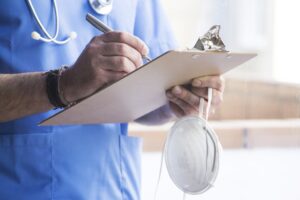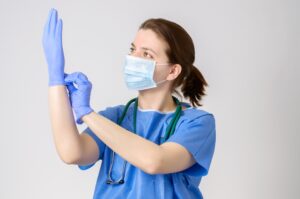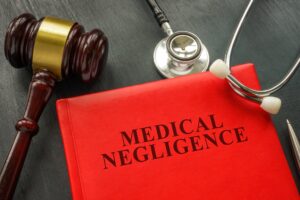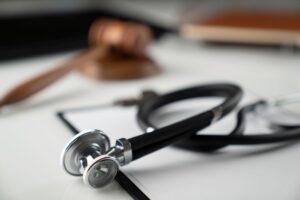By Danielle Graves. Last Updated 3rd January 2024. Have you caught a hospital-acquired infection whilst visiting a hospital for treatment, staying in hospital as a patient or working in a hospital? If you believe you contracted the infection because the hospital did not take the proper steps to protect you, you may be able to claim hospital infection compensation for your resulting illness.
If you have been infected with a bacterial infection, or viral infection because of negligence on the part of a hospital, you may be wondering:
- “Can you sue if you get an infection after surgery?”
- “Can I sue the hospital for an MRSA infection?”
- “Can I claim for hospital-acquired pneumonia?”
The answer to all of the above is yes. If it can be proven that the hospital owed you a duty of care and you were made ill because of malpractice on the part of the hospital, you may be entitled to claim compensation.

Hospital-acquired infection compensation claims
If you believe you are owed compensation for a hospital-acquired infection, Legal Helpline can help you. Call us today on 0161 696 9685 for your free hospital negligence claims consultation. We will speak to you in-depth about your ordeal and if we believe you are owed compensation, we can provide you with an experienced personal injury solicitor to handle your compensation claim. Call now to see if you are entitled to claim or use our online claims form to get in contact with us. We’re looking forward to hearing from you.
Jump To A Section
- What Is A Hospital Acquired Infection?
- Causes Of Hospital Acquired Infections
- What Infections Could You Get From A Hospital?
- How Long Do I Have To Claim Compensation For Hospital Acquired Infections?
- Compensation For Hospital Acquired Infections
- Steps To Take If You Contracted An Infection In A Hospital Due To Negligence
- No Win No Fee Claims For Hospital Acquired Infections
- Hospital And Medical Negligence Resources
What Is A Hospital Acquired Infection?
A hospital-acquired infection is a viral infection or a bacterial infection that a patient or hospital employee contracts in a hospital. To count as a hospital-acquired infection, the person will not have already been infected when they arrive at the hospital. Instead, the infection is generally contracted 48 hours after admittance. It’s also possible for a hospital worker to contract an infection during their shift. A hospital-acquired infection is also referred to by its medical name, a nosocomial infection.
Hospitals have a duty of care towards their staff and patients. This means that the hospital administration must ensure that the hospital environment is a safe and hygienic environment for patients, staff and other people that use the site.
Medical staff such as doctors, nurses and anaesthetists also owe patients a duty of care. If a hospital employee or patient is made ill because of negligent actions or inactions on the part of the hospital administration, or a hospital worker, this would be classed as medical negligence (also known as clinical negligence, or medical malpractice). As a result, the NHS Trust or private healthcare provider which runs the hospital could be held liable for the person’s illness. As a result, they would have the right to make a medical negligence claim for compensation.

A hospital acquired infection claim can be made for infectious diseases picked up in a healthcare setting.
Causes Of Hospital Acquired Infections
Bacteria are everywhere and many bacterias that cause hospital superbugs can be found on the skin of healthy people. In most circumstances bacterias are non-threatening. Bacterial infections may often be spread by skin-to-skin contact. There are many reasons why infections are more likely to spread in a hospital environment:
- A patient’s skin may be pierced by a needle or catheter, or they may suffer from an open wound or sores. These can be an entry point for the bacteria.
- Hospitals are busy places with numerous patients, staff and visitors, making them a breeding ground for bacteria.
- Hospitals look after patients who are already ill and might be suffering from a weakened immune system.
What Infections Could You Get From A Hospital?
There are various illnesses you could potenitally acquire during a hospital stay. A few examples of common hospital acquired infections include:
- Methicillin-resistant staphylococcus aureus, or MRSA. According to the NHS, most people who carry MRSA on their skin do not have any symptoms. Hand washing could help prevent the spread of MRSA. Additionally, it is possible to screen patients who are attending a scheduled surgery and provide the correct treatment for those who test positive.
- Escherichia coli or E. coli. In addition to physical pain, infection with E. coli infection may cause bowel problems, including diarrhoea and stomach cramps. E. coli may also lead to urinary tract infections (UTI) and bacteremia. To help prevent the spread of E. coli, good hygiene standards are required, including hand washing and ensuring that equipment is disinfected.
- Clostridim difficile or C-Diff. This is a type of bacteria that can cause those affected to experience diarrhoea. Other symptoms include feeling sick, stomach ache, appetite loss and a high temperature. Risk factors include taking antibiotics (or recent use), a long hospital stay and a weakened immune system. To help prevent hospital acquired infections, staff members should wash their hands and take other hygiene precautions.
In serious cases, hospital infections may be life-threatening or even result in premature death. Vulnerable patients include those with weakened immune systems, those with underlying health conditions and premature babies. However, a healthy person can still be vulnerable to hospital infections. An example could be if you had a needlestick or syringe injury during your hospital stay.
Contact our advisory team to discuss an infection you acquired in a hospital setting to see whether you could be eligible to make a medical negligence claim. They can also help answer any questions you may have about the hospital acquired infection claims process.
How Long Do I Have To Claim Compensation For Hospital Acquired Infections?
In addition to meeting the claiming criteria for medical negligence, you must also start legal proceedings within the time limits set by the Limitation Act 1980. This is typically three years from the date you were harmed. Alternatively, this could be three years from the date of knowledge. This is the date that you first connected the infection with hospital negligence.
However, in certain claims for compensation for hospital acquired infections, there are time-limit exceptions. These include:
- Those who lack the mental capacity to start legal proceedings for themselves. For these parties, there is an indefinite suspension of the limitation period. During this time, a court-appointed litigation friend can act on their behalf. However, if they regain this mental capacity, they will have three years from the date of recovery to start a claim if one was not already made on their behalf.
- Those under the age of 18. For these parties, there is a pause in the limitation period lasting until their 18th birthday. Prior to this date, a litigation friend can file a claim for them. Once they reach their 18th birthday, they will have three years from that date to start proceedings if a litigation friend did not act on their behalf.
If your infection was contracted in a hospital, you might be entitled to compensation. Please get in touch with one of the advisors on our team. They can check your eligibility to claim, including assessing whether you are within the limitation period.
Compensation For Hospital Acquired Infections
If you make a successful hospital claim, your compensation could consist of two parts. These are general and special damages.
General damages compensate for the harm you have endured due to a medical professional breaching their duty of care. When assigning value to this part of your hospital acquired infection claim, legal professionals may refer to a document titled the Judicial College Guidelines (JCG). It lists guideline compensation brackets for various types of harm.
In our table below, we listed a few figures from the JCG’s 16th edition. We’ve also included the top row, which isn’t taken from the JCG. This is to help illustrate how compensation could be awarded in a successful claim that includes more than one illness or injury plus expenses. As every claim is different, the table is only provided for guidance.
| Illness / Injury | Information on the illness / injury | Settlement |
|---|---|---|
| Multiple serious injuries and illness plus your expenses | Settlements could include compensation for more than one very serious injury or illness as well as incurred expenses, such as nursing care and lost wages. | Up to £500,000+ |
| Kidney Damage (a) | Damage to the kidneys which is this significant could lead either permanent injury or even loss of both kidneys. | £169,400 to £210,400 |
| Kidney Damage (b) | Less serious than the above category, however there is the possibility of serious problems with the kidney(s) in the future. | Up to £63,980 |
| Kidney Damage (c) | One kidney has been lost, though the other is functioning. | £30,770 to £44,880 |
| Bowel Injury (a) | At this level, the claimant may have double incontinence involving loss of bowel and urinary control. | Up to £184,200 |
| Bowel Injury (b) | The claimant has lost bowel control and requires the use of a colostomy. | Up to £150,110 |
| Bowel Injury (c) | Symptoms could include faecal urgency and passive incontinence even after surgery or treatment. This could lead to embarrassment and distress. . | In the region of £79,920 |
| Bowel Injury (d) | Such bowel injuries could impair function and will require a colostomy on a temporary basis. | £44,590 to £69,730 |
| Non-Traumatic Injury To The Digestive System (i) | This could include a severe illness which could lead to symptoms such as vomiting, diarrhea, fever and pain. Symptoms will be serious and acute. . | £38,430 to £52,500 |
| Non-Traumatic Injury To The Digestive System (ii) | This level of illness or injury is serious and acute, but shorter lasting. The symptoms could be similar to those listed above. | £9,540 to £19,200 |
Additionally, your medical negligence compensation settlement may also include special damages. This compensates you for the financial losses you have suffered due to the medical negligence.
A few examples of the losses that you could be compensated for under special damages include:
- Loss of earnings for any time you spent off work recovering.
- Medical expenses, including prescriptions and therapy costs.
- Care costs if you require nursing while recovering.
- Travel expenses such as the costs of taxi fares to attend medical appointments.
You should submit proof of your expenses, such as receipts for medications and your payslips.
If you would like a free, personalised valuation of your medical negligence claim, speak to one of the advisors from our team.
Steps To Take If You Contracted An Infection In A Hospital Due To Negligence
Can you claim for contracting coronavirus or can you claim for contracting an MRSA? If you have evidence that you contracted a hospital-acquired infection because of hospital negligence, you may be able to claim compensation. You can do the following to gather evidence to support your claim.
- Take photographs of or film health and safety hazards that may have caused your infection. For example, medical staff not being provided with the correct PPE or engaging in the correct handwashing procedures.
- Take photographs of any physical signs of your infection.
- Document your pain and suffering by writing a journal, for instance, if you’re able. This can be used as evidence in a subsequent claim.
- Speak to eyewitnesses who may be able to make a statement on your behalf and make a note of their names and contact details.
No Win, No Fee Claims For Hospital Acquired Infections
At Legal Helpline, we wish to support you in your stressful time and help you restore normality whilst achieving justice. This is why all of the solicitors on our panel will give you the option of entering into a No Win, No Fee agreement, also known as a Conditional Fee Agreement (CFA). Under a CFA, you will not have to pay any fees upfront or during the claim and if your claim does not succeed, you will not have to pay any of the fees your solicitor has incurred in pursuing your case.
If your case does succeed, your solicitor may ask for a small contribution toward their costs. This would be deducted from the compensation awarded at the end of the claim. It’s known as a success fee, but don’t worry, they’re legally capped and the percentage will be agreed with you when signing the CFA.
To learn more about the benefits of making a No Win No Fee claim for a hospital-acquired infection, call Legal Helpline and one of our advisors will be happy to speak to you in-depth.
Contact Legal Helpline About Your Claim
Have you experienced MRSA, sepsis, pneumonia, bedsores, cellulitis, a urinary tract infection, a surgical site infection or any other type of bacterial infection or viral infection, due to medical negligence? Then you could be entitled to claim compensation. Contact Legal Helpline today to begin your claim. Call us on 0161 696 9685 or use our online claims form to reach us, and if you have legitimate grounds to claim, we will provide you with an excellent personal injury solicitor to handle your claim.
Hospital And Medical Negligence Resources
- How Much Compensation Can I Claim For Hospital Resulting In Death – How to claim compensation for deaths caused by hospital care.
- How Much Compensation Can I Claim For Pressure Sores – How to make a claim for a pressure sore.
- Emergency Services Vehicle Accidents Claims – Claims for accidents involving emergency services vehicles.
External Resources
- A NICE Guide To Preventing And Controlling Healthcare-Associated Infections – Clinical care guidelines from the National Institute for Health and Care Excellence
Guide by HE
Edited by REG




